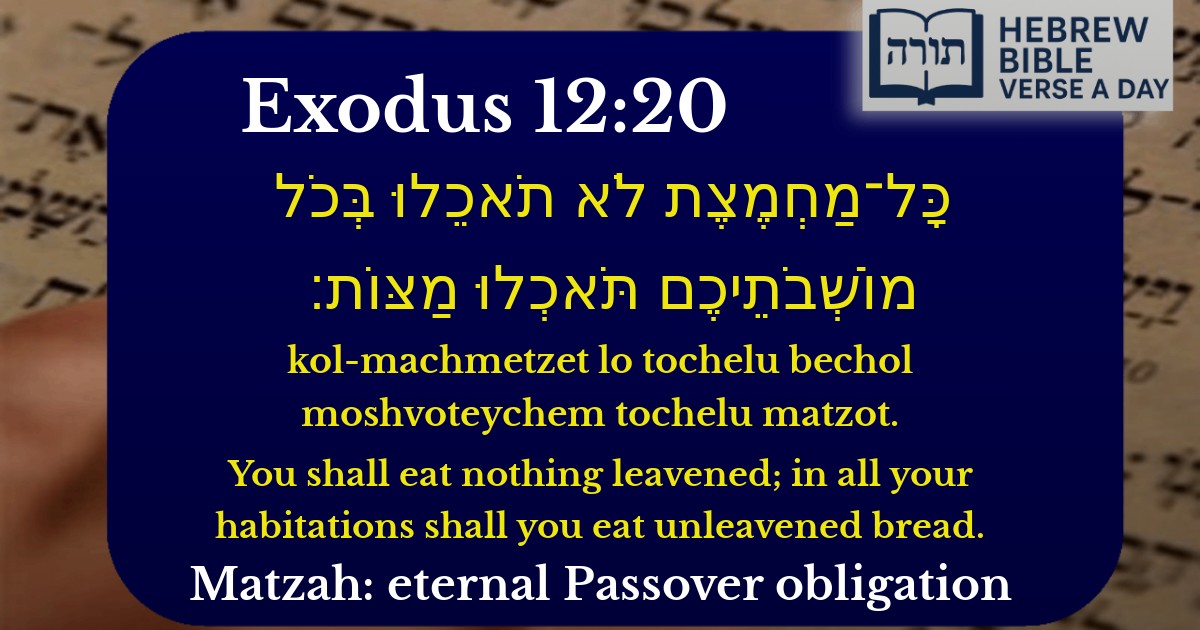Join Our Newsletter To Be Informed When New Videos Are Posted
Join the thousands of fellow Studends who rely on our videos to learn how to read the bible in Hebrew for free!
Hebrew Text
כָּל־מַחְמֶצֶת לֹא תֹאכֵלוּ בְּכֹל מוֹשְׁבֹתֵיכֶם תֹּאכְלוּ מַצּוֹת׃
English Translation
You shall eat nothing leavened; in all your habitations shall you eat unleavened bread.
Transliteration
Kol-machmetzet lo tochelu bechol moshvoteychem tochelu matzot.
Hebrew Leining Text
כׇּל־מַחְמֶ֖צֶת לֹ֣א תֹאכֵ֑לוּ בְּכֹל֙ מוֹשְׁבֹ֣תֵיכֶ֔ם תֹּאכְל֖וּ מַצּֽוֹת׃ <span class="mam-spi-pe">{פ}</span><br>
כׇּל־מַחְמֶ֖צֶת לֹ֣א תֹאכֵ֑לוּ בְּכֹל֙ מוֹשְׁבֹ֣תֵיכֶ֔ם תֹּאכְל֖וּ מַצּֽוֹת׃ {פ}
🎵 Listen to leining
Parasha Commentary
📚 Talmud Citations
This verse is quoted in the Talmud.
📖 Pesachim 5a
The verse is discussed in the context of the prohibition against eating leavened bread during Passover and the commandment to eat unleavened bread.
📖 Pesachim 28b
The verse is referenced in a discussion about the time frame for eating unleavened bread and the prohibition of leavened products.
📖 Makkot 16b
The verse is cited in a broader discussion about the commandments related to Passover and the importance of adhering to them.


Prohibition of Chametz and Mitzvah of Matzah
The verse (Shemot 12:20) establishes two fundamental commandments related to Pesach: the prohibition against consuming chametz (leavened products) and the positive commandment to eat matzah (unleavened bread). Rashi explains that the phrase "כָּל־מַחְמֶצֶת לֹא תֹאכֵלוּ" ("You shall eat nothing leavened") refers not only to chametz itself but also to any mixture containing chametz, emphasizing the strictness of this prohibition during Pesach.
Geographical Scope of the Mitzvah
The phrase "בְּכֹל מוֹשְׁבֹתֵיכֶם" ("in all your habitations") teaches that these laws apply universally, whether one is in Eretz Yisrael or outside of it. The Rambam (Hilchot Chametz U'Matzah 6:1) rules that the mitzvot of chametz and matzah are binding in all places and for all generations, underscoring their eternal nature.
Symbolism of Matzah
The Mechilta connects the eating of matzah to the haste of the Exodus, as the dough did not have time to rise when Bnei Yisrael left Mitzrayim. The Seforno adds that matzah represents humility and simplicity, contrasting with the inflated nature of chametz, which symbolizes arrogance and the yetzer hara (evil inclination).
Halachic Implications
The Shulchan Aruch (Orach Chaim 442:1) elaborates on the practical requirements: chametz must be removed from one's possession, and matzah must be eaten on the first night of Pesach. The Mishnah Berurah emphasizes that the matzah must be guarded from becoming chametz from the time of harvesting the wheat (or at least from the time of grinding), known as matzah shmurah.